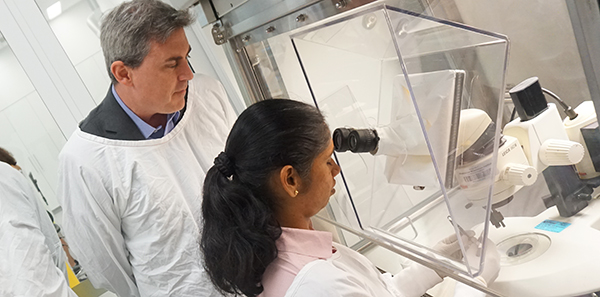1:30min

Dr Andrew White with a member of the glaucoma research team Photo: Westmead Institute for Medical Research
______________________________
By Helen Carter
Journalist
Sydney researchers are working on repurposing a common blood pressure medication into specially formulated eye-drops to prolong the life of retinal cells that die in glaucoma.
Ophthalmologist and scientist Dr Andrew White said the research was promising and had extended the life of mouse retinal cells in cell culture.
The research may lead to personalised treatments for glaucoma patients based on genetic profiling to prevent people at high risk of glaucoma from developing the potentially blinding condition.
Dr White is a glaucoma specialist and surgeon at Westmead Hospital and head of the Glaucoma Research Centre at the Centre for Vision Research, Westmead Institute for Medical Research, which is conducting the research.
Speaking during World Glaucoma Week this week, 6-12 March, Dr White said it could cost pharmaceutical companies up to $2 billion to develop a new molecule and there was a 99 per cent chance it would not work.
Instead the Westmead glaucoma research team is investigating existing drugs including statins and anti-hypertensives which have proved to be safe and effective, and are used extensively to determine whether they could have a role in glaucoma prevention or treatment.
‘We are trying to see if we can repurpose these drugs to find ways they can be absorbed properly into the eyes,’ he told Australian Optometry.
‘We have found in a mouse model of retinal cells in culture that a common class of blood pressure medication can prolong the life of cells which normally die in glaucoma. We can improve the lifespan of these retinal cells by applying this drug.’
He said the medications needed to be reformulated so that they did not act systemically because lowering blood pressure could actually worsen glaucoma. Reformulated eye-drops would specifically target only the retinal cells that were most likely to die in glaucoma.
Dr White said the next stage was to find the best way to get the medication into the eye so it targeted only these cells.
‘The most likely way to get the medication into the eye and direct it to the cells most likely to die is through nanoparticles in a specially formulated eye-drop which targets these retinal cells,’ he said. ‘We are looking for the right tag and hook so the nanoparticles can latch onto the cells most likely to die.’
Genes
The Westmead team is also researching whether genes associated with glaucoma risk can be controlled by repurposing these drugs to create tailored inexpensive glaucoma therapies.
‘In the next year or so we will move to mouse models and then if successful, we will trial the reformulated medication in people whose genes put them at higher risk of glaucoma, such as people in the Blue Mountains Eye Study who were identified as carrying genetic variations,’ Dr White said.
The Westmead team was previously part of an international collaboration that identified three genetic variants associated with the most common form of glaucoma, primary open angle glaucoma.
Using data from the Blue Mountains Eye Study, which examined more than 3,600 residents aged 49 years and older, the Westmead researchers then found, in a world first study, that the previously discovered genetic variations were associated with onset of the disease and could be useful in predicting glaucoma risk.
‘There are now a number of genes found associated with increased risk of glaucoma,’ Dr White stated in a media release. ‘Nobody knows what they do or how they work. We are looking at the mechanisms behind these genetic risk factors and how we can tailor specific treatments for those at risk.
‘Glaucoma affects 400,000 Australians and costs the economy approximately $2 billion a year. Treatments continually need improvement and we think we are on the way to finding some of those therapies.’
Dr White said Glaucoma Week aimed to raise awareness of glaucoma and he encouraged everyone over 40 years to have an eye examination to test for early signs as 50 per cent of Australians with glaucoma are undiagnosed.
He said glaucoma ran in families and encouraged families to have the conversation and have a check.
Read about Glaucoma Australia’s B.I.G (Beat Invisible Glaucoma) Breakfast fundraiser events this week.